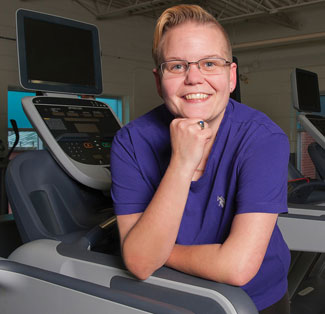Patient Stories
![]()
Joyce Davidson of Danvers is a woman who knows her own mind. A straight shooter who works as a traffic-control manager for U-Haul, she’s used to being in charge. So when she was confronted with a serious health crisis that she couldn’t manage on her own, she faced a difficult choice.
Last winter, Davidson was diagnosed with intracranial hypertension, a condition brought on by increased pressure on the brain that can lead to severe headaches and vision loss.

As is often true in such cases, Davidson’s weight was an exacerbating factor. To address her condition, Davidson was presented with two options: surgery to insert a shunt into her brain to relieve the pressure or significant weight loss.
Because intense physical activity can aggravate the symptoms of intracranial hypertension, she couldn’t rely on exercise to lose weight as she had done in the past.
“I was 32 years old and didn’t want brain surgery,” Davidson recalls. “I had thought about weight-loss surgery in the past, and now it seemed like the right choice at the right time.”
Davidson was referred to the NSMC Surgical Weight Loss Program, the largest and most successful program of its kind on the North Shore. She began as all potential patients do with an information session that outlined the pros and cons of weight-loss surgery and provided an overview of various procedures. Patients who opt for surgery participate in an extensive evaluation process and post-operative program, including nutrition, wellness and exercise counseling, ongoing education and support-group sessions.
“There is no single solution for weight-loss patients,” says Jaime Rivera, M.D., co-director of the NSMC Surgical Weight Loss Program. “Our program educates patients so that they can make informed decisions that suit their individual situations and goals.”
In consultation with Dr. Rivera, Davidson opted for gastric-sleeve surgery, during which 75 to 80 percent of the stomach is removed and the remaining portion is turned into a skinny tube. The smaller size and shape of the stomach help limit portion size and calorie intake. Gastric-sleeve surgery is also reported to affect the hormones that control appetite, which can further contribute to weight loss.

Within a week of her surgery last April, Davidson was up and walking. Two weeks later, she was exercising. Three months later, she and her wife, Ember, completed a 12-mile hike in the White Mountains. Today, Davidson has lost more than 100 pounds, works out and plays basketball regularly and feels better than she has in years. Along with her own self-motivation, she credits much of her success to the support she’s received at home and through the Surgical Weight Loss Program.
“I can’t say enough about Dr. Rivera and his team,” she says. “They are forthcoming and honest, and I can always count on them whenever I have a question. I couldn’t imagine doing this without them.”
“Support is the cornerstone of our program,” says Dr. Rivera. “It starts on day one and continues for at least five years.”
Nearly a year after surgery, Davidson is happy with her decision. She was promoted at work, is working toward her bachelor’s degree and says her marriage is stronger than ever. “The change in my life is real,” she says. “The circumstances may not have been ideal when this journey began, but it’s been a win in every way since.”
FREE INFO SESSIONS:
NSMC’s Surgical Weight Loss Program is now offering free information sessions at NSMC Salem Hospital and the Mass General/North Shore Center for Outpatient Care in Danvers. These sessions offer a great opportunity to learn more about weight loss surgery options and ask questions. Register online

